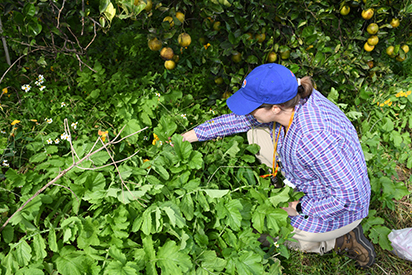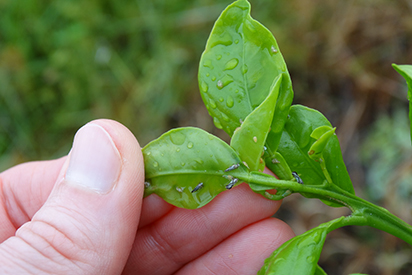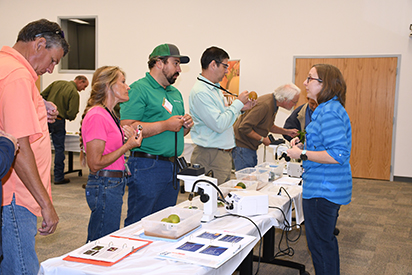Dr. Lauren Diepenbrock's Laboratory
Welcome to the Diepenbrock lab! Our group primarily focuses on Insect Ecology and Integrated Pest Management in citrus production systems with the goal of providing targeted management tools to citrus growers regionally, nationally, and internationally.
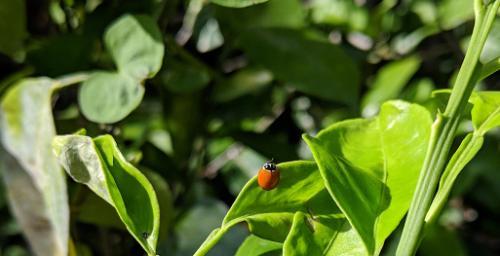
Current Research Topics
- Asian Citrus Psyllid management
- Non-target impacts of Asian Citrus Psyllid management
- Habitat enhancement for beneficial insects
Extension Programming
- Florida Citrus Production Guide
- Citrus insect management workshop
- Educational materials (currently under development!)
-
Research Projects
Asian Citrus Psyllid Management
Asian citrus psyllid (ACP) is an invasive species that has been in Florida since the late 1990s. No only is the insect itself a pest to citrus trees, it is also a vector for Candidatus Liberibacter asiaticus, the bacteria linked to citrus greening (Huanglongbing/HLB). This disease is a threat to the worldwide production of citrus. In Florida, much research has gone into both short and long term management options for both the pest insect and the pathogen. Despite these efforts, the pest still remains a major management challenge and there is still a lot of research to be done both in terms of the ecology of the pest-pathogen complex and ready to use management tools.
Our lab is currently involved in several projects pertaining directly to ACP and HLB:
- Determining parameters for establishing healthy new plantings (comparison of new tools including exclusion bags, reflective mulch, and kaolin clay with current standards)-- with collaborators Dr. Megan Dewdney, Dr. Evan Johnson, Dr. Davie Kadyampakeni, and Dr. Christopher Vincent
- Behavioral repellents (new product evaluation, parameter determination)-- with collaborators Dr. Lukasz Stelinski, Dr. Monique Rivera, and Dr. Mamoudou Setamou
- Cover crop for soil and tree health improvement (ACP management is an add-on to their main goals)-- Lead PI: Dr. Sarah Strauss
- Refining the use of reflective mulch to deter psyllids and alleviate trees from pathogen pressure-- Lead PI: Dr. Jawwad Qureshi
- Exclusion bagging for production of ACP/HLB free grapefruit-- Lead PI: Dr. Arnold Schumann
Non-target Impacts of ACP Management
Citrus greening has an enormous economic impact on citrus production. As such, efforts to reduce the population of vectors (ACP) and/or minimize their movement and the corresponding spread of the pathogen are important for managing the disease. To slow the initial spread of disease, area-wide management in the form of coordinated insecticide-based management was performed throughout much of the state of Florida (CHMA program). Unfortunately, there were challenges to the full implementation of this program and it has since dissolved. But groves still require active management, and at present, insecticides are the primary tool for vector management. Exposure to these materials can also have impacts on organisms other than the intended target(s).
Projects looking at non-target impacts of ACP management
- Documenting non-ACP pest arthropod populations under relaxed new management paradigms- Several pests inclusing citrus leafminer (CLM), many scales, and whiteflies associated with citrus have largely been under control by a combination of generalist predators and specialist parasitoids. During intense ACP management, these pests were also kept at a minimum likely from exposure to broad-spectrum insecticide applications. Recently, there has been a shift in many overall grove management programs to focus on plant health and reduce insecticide reliance. With this shift, we anticipate seeing populations of several pests like scales and whitefly become more apparent and potentially problematic. What we don't know is if the predators, including parasitoids, are still present and sufficiently abundant to control these pests.
Habitat enhancement for beneficial insects
Beneficial insects, particularly predators/parasitoids, have a long history of being integral parts of pest management in citrus. The intense management meeded to reduce ACP impacts has reduced the visible abundance of these organisms which used to be easily spotted in Florida citrus groves. Researchers across the state are interested in developing management options that enable beneficial arthropods (insects, mites, and spiders) to re-establish and thrive once again.
Projects for promotion of beneficial insects
- Influence of vegetation diversity/complexity in windbreaks on pest management-- Lead PI: Dr. Xavier Martini
- Cover crop for soil and tree health improvement (ACP management is an add-on to their main goals)-- Lead PI: Dr. Sarah Strauss
- Non-crop habitat for beneficial arthropods (project under development)
Invasive arthropods and their management
Citrus is a global crop, it is grown in over 100 countries and imported/exported throughout the world. As such, movement of pests and diseases is a major concern. Like all traded items, movement of citrus fruit into and out of countries is heavily regulated to minimize the potential for pests to move on these shipments. Sometimes, however, pests and diseases still manage to be moved into new areas where they can become problematic. Approximately two decades ago, this was the case for the arrival of Asian citrus psyllid, the primary vector of CLas (see above). In 2019, Florida growers have been challenged by the finding of a mealybug, Nipaecoccus viridis, which is known to be problematic in citrus production in other parts of the world. Our lab is working with our state regulatory authority, the Florida Department of Agriculture and Consumer Services- Division of Plant Industry, and industry partners to help our growers detect and manage this pest.
- Biology and ecology of Nipaecoccus viridis
- Determining breadth of potential predators of Nipaecoccus viridis
- Field management of Nipaecoccus viridis
-
Publications
2021
Diepenbrock, L.M. 2021. Laboratory screening of conventional insecticides for the control of Nipaecoccus viridis, an invasive pest in Florida citrus. Arthropod management tests. DOI: 10.1093/amt/tsaa117
Diepenbrock, L.M., Olabiyi, D.O., and P.B, Avery. 2021. Laboratory screening of selected entomopathenogenic fungi, bioinsecticide, and insect growth regulator against Hibiscus mealybug, Nipaecoccus viridis Newstead. Arthropod Management Tests. DOI: 10.1093/amt/tsaa121
2020
Benge, M., Martini, X., Diepenbrock, L. M., & Smith, H. A. 2020. Determining the professional development needs of Florida integrated pest management Extension agents. Journal of Extension, 58(6), Article v58-6rb5. https://open.clemson.edu/joe/vol58/iss6/15/
Diepenbrock, L.M. and M.Z. Ahmed. 2020 First Report of Nipaecoccus viridis (Hemiptera: Pseudococcidae) associated with citrus production in the United States. Journal of Integrated Pest Management. 11(1):7; 1-4. DOI 10.1093/jipm/pmaa004
Schöneberg, T., Aresnault-Benoit, A., Taylor, C.M., Butler, B.R., Dalton, D.T., Walton, V.M., Petran, A., Rogers, M.A., Diepenbrock, L.M., Burrack, H.J., Leach, H., Van Timmeren, S., Fanning, P.D., Isaacs, R., Gress, B.E., Bolda, M.P., Zalom, F.G., Roubos, C.R., Evans, R.K., Sial, A.A., Hamby, K.A. 2020. Pruning of small fruit crops can affect habitat suitability for Drosophila suzukii. Agriculture, Ecosystems & Environment. 294: 106860. DOI 10.1016/j.agree.2020.106860
Stockton, F.G., Wallingford, A.K., Brind’amore, G., Diepenbrock, L., Burrack, H., Leach, H., Isaacs, R., Iglesias, L. E., Liburd, O., Drummond, F., Ballman, E., Geudot, C., Van Zoeren, J., and G.M. Loeb. 2020. Seasonal polyphenism of spotted wing drosophile is affected by variation in local abiotic conditions within its invaded range, likely influencing survival and regional population dynamics. Ecology and Evolution. DOI: 10.1002/ece3.6491
Olazcuaga, L., Loiseau, A., Parrinello, H., Paris, M., Fraimout, A., Guedot, C., Diepenbrock, L.M., Kenis, M., Zhang, J., Chen, X., Borowiec, N., Facon, B., Vogt, J., Price, D.K., Vogel, H., Prud’homme, B., Estoup, A., and M. Gautier. 2020 A whole-genome scan for association with invasion success in the fruit fly Drosophila suzukii using contrasts of allele frequencies corrected for population structure. Molecular Biology and Evolution. DOI: 10.1093/molbev/msaa098
2019
Cloonan, K.R., Hernández-Cumplido, J., Viana de Sousa, A.L., Romalho, D.G., Burrack, H.J., Della Rosa, L., Diepenbrock, L.M., Ballman, E., Drummond, F.A., Gut. L.J., Hesler, S., Isaacs, R., Leach, H., Loeb, G.M., Nielsen, A.L., Nitzsche, P., Park, R.R., Syed, Z., Van Timmeren, S., Wallingford, A.K., Walton, V.M., and C. Rodriguez-Saona. 2019. Laboratory and field evaluation of host-related foraging odor-cue combinations to attract Drosophila suzukii (Diptera:Drosophilidae). Journal of Economic Entomology 112(6): 2850-2860. Doi: 10.1093/jee/toz224
Stockton, D.G., Wallingford, A., Rendon, D., Fanning, P., Green, C. K., Diepenbrock, L., Ballman, E., Walton, V.M., Isaacs, R., Leach, H., Sial, A. A., Drummond, F., Burrack, H., and Loeb, G.M. 2019. Interactions between biotic and abiotic factors affect survival in overwintering Drosophila suzukii (Matsumura). Environmental Entomology. DOI: 10.1093/ee/nvy192
2018
Diepenbrock, L.M., Lundgren, J.G, Sit, T.L, and H.J. Burrack. 2018. Detecting specific resource use by Drosophila suzukii (Diptera: Drosophilidae), a mobile, highly polyphagous fruit pest, using gut content analysis. Journal of Economic Entomology. DOI: 10.1093/jee/toy077
Diepenbrock, L.M. and D. R. McPhie. 2018. Use of a novel host plant family, Basallaceae, by Drosophila suzukii (Diptera: Drosophilidae). Proceedings of the Entomological Society of Washington. DOI: 10.4289/0013-8797.120.2.255
2017
Van Timmeren, S., Diepenbrock, L.M., Bertone, M. A., Burrack, H. J. and R. Isaacs. 2017. A filter method for improved monitoring of Drosophila suzukii (Diptera: Drosophilidae) larvae in fruit. Journal of Integrated Pest Management. DOI: 10.1093/jipm/pmx019
Diepenbrock, L.M., Hardin, J.A., and H.J. Burrack. 2017. Season-longprograms for control of Drosophila suzukii in southeastern blackberry crops. Crop Protection. DOI: 10.1016/j.croppro.2017.03.022
2016
Diepenbrock, L.M. and H.J. Burrack. 2016. Variation of within-crop microhabitat use byDrosophila suzukii (Diptera: Drosophilidae) in blackberry. Journal of Applied Entomology. DOI 10.1111/jen.12335
Diepenbrock, L.M., K.V. Tindall, K. Fothergill, J.E. Losey, R.R. Smyth, and D.L. Finke. 2016. The influence of exotic lady beetle (Coleoptera: Coccinellidae) establishment on in the species composition of the native lady beetle community in Missouri. Environmental Entomology. DOI 10.1093/ee/nvw065
Diepenbrock, L.M., K.A. Swoboda-Bhattarai, and H.J. Burrack. 2016. Ovipositional preference,fidelity, and fitness of Drosophila suzukii in a co-occurring crop and non-crop host system. Journal of Pest Science. DOI 10.1007/s10340-016-0764-5
Diepenbrock, L.M., D.O. Rosensteel, J.A. Hardin, A.A. Sial, and H.J. Burrack. 2016. Season-long programs for control of Drosophila suzukii in southeastern blueberries. Crop Protection. 81: 76-84.
2015
Diepenbrock, L.M., and H.J. Burrack. 2015. Efficacy of bait sprays for the control ofDrosophila suzukii (Diptera: Drosophilidae) in blueberries. Arthropod Management Tests.40 (1).
Diepenbrock, L.M., J. Hardin, and H.J. Burrack. 2015. Efficacy of insecticides against Drosophila suzukii (Diptera: Drosophilidae) in blueberries. Arthropod Management Tests. 40 (1).
2013
Diepenbrock, L.M., and D.L. Finke. 2013. Refuge for native lady beetles (Coccinellidae) in grassland habitats. Insect Conservation and Diversity. 6(6): 671-679. DOI: 10.1111/icad.12027
2012
Worsham, H. and L. Diepenbrock. 2012. Evaluating Scientific Content: Misinformation About Insects in a Popular Children's Movie. American Biology Teacher. 75(5): 341-343.
2011
Hart, L.M., and W.R. Tschinkel. 2011. A seasonal natural history of Odontomachus runneus. Insectes Sociaux. 59(1): 45-54. DOI: 10.1007/s00040-011-0186-6
-
Extension
Keeping extension agents, growers, grove managers, and technical representatives from the industry up to date on citrus arthropod management is one of our major roles in citrus production. The Diepenbrock lab extension program includes workshops, information sheets (EDIS documents), grove visits, and outreach programs.
Current extension outputs include:
- The Florida Citrus Production Guide
- Insect Management Workshop
- County presentations
Quick Pest Guides
Insect informational pages
Citrus pest management EDIS documents
- PPE reference guide for low-volume ground citrus applicators
- Quick reference guide to citrus insecticides and miticides
- Citrus canker & Greening for Master Gardener Plant Clinics
- Citrus greening, Blight and Tristeza Comparison Identification sheet
- Citrus Greening: A serious threat to the Florida Citrus Industry
Children's Citrus Activity Pages
-
Openings
Contact PI via e-mail for inquiries regarding graduate student and postdoc opportunities.
-
Current Lab Members

Lauren Diepenbrock
PI
863.956.8801
ldiepenbrock@ufl.eduResearch interests: Insect ecology, invasive species, and pest management in agricultural systems.

David Olabiyi
PhD student
davidolabiyi@ufl.edu
WebsiteResearch interests: Studying insect behavior, ecology, and biological control for sustainable pest management

Emilie Demard
Postdoctoral Researcher
edemard@ufl.edu
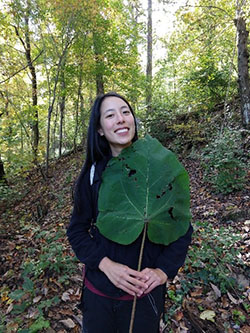
Angela Chuang
Postdoctoral Researcher
angelachuang@ufl.eduResearch interests: Angela is interested in factors that influence natural enemy diversity and abundance in agroecosystems. She is also generally interested in broad topics within invasion science, behavioral ecology, and arachnology.

Lena Craft
Biological Scientist/Lab Manager
lenacraft@ufl.edu

Guoping Liu
Technical Staff
guoping@ufl.edu

Tracy Liesenfelt
Technical Staff
tliesenfelt@Knights.ucf.edu

Diana Estrada
Technical Staff
diana.estrada@ufl.edu -
Previous Lab Members
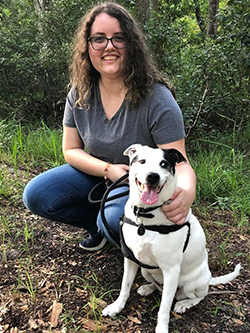
Abigail Prohofsky
Doctor of Plant Medicine Intern, Summer 2022

Marek Harrison
Technical Staff
marekh1218@gmail.com
Website
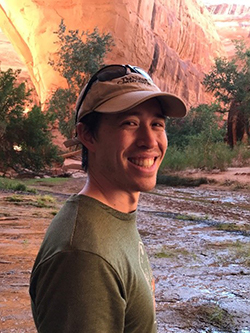
Eric Middleton
Postdoctoral Researcher
emiddleton@ufl.eduResearch interests: Eric is interested in the intersection of entomology and sustainable agriculture, specifically how to incorporate beneficial insects with existing management practices to benefit food production.
Current Position: Area IPM Advisor, University of California- Agriculture and Natural Resources (Webpage)

Lourdes Perez Cordero
MS student
lperezcordero@ufl.eduResearch interests: I’m interested in insect behavior and the relationship between insects and the environment, humans, and other organisms.

Kristen Gaines
MS student
kristencgaines@ufl.eduResearch interests: I’m interested in utilizing molecular techniques to identify natural enemies
of the Lebbeck mealybug, Nipaecoccus viridis. I am also investigating how the presence of ants
affects the diversity of natural enemies present and potentially feeding on this pest in the field.

Harry Anderson
Technical Staff
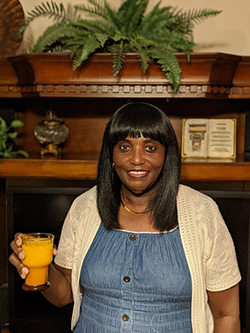
Peaches Mariner
Technical Staff
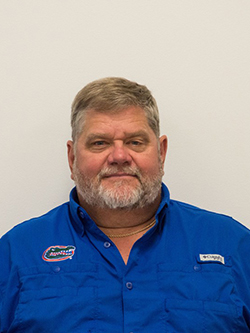
Gary Test
Technical Staff


